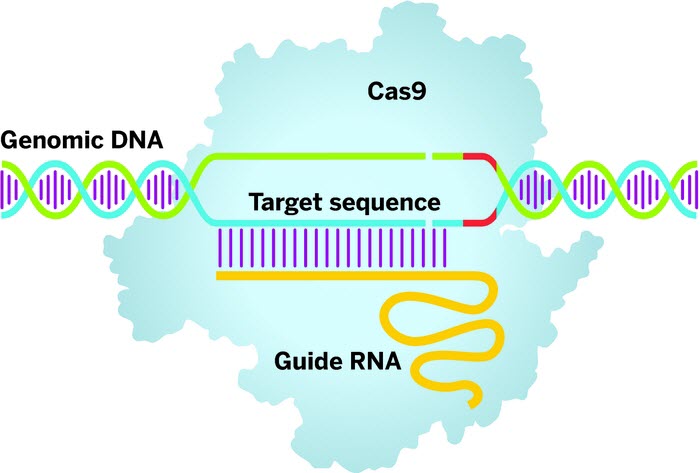The CRISPR controversy: faster, cheaper gene editing vs. bioethicists
September 10, 2015

Clustered regularly interspaced short palindromic repeats (CRISPRs) technology employs a guide RNA to direct the Cas9 enzyme (light blue) to a target DNA sequence. Once there, Cas9 will bind when it finds a protospacer-adjacent motif sequence (red) in the DNA and cut both strands, priming the gene sequence for editing. (credit: Adapted from OriGene Technologies)
Within the past few years, a new technology has made altering genes in plants and animals much easier than before. The tool, called CRISPR/Cas9 or just CRISPR, has spurred a flurry of research that could one day lead to hardier crops and livestock, as well as innovative biomedicines.
But along with potential benefits, it raises red flags, according to an open-access article in Chemical & Engineering News (C&EN), the weekly newsmagazine of the American Chemical Society.
Ann M. Thayer, a senior correspondent at C&EN, notes that scientists have long had the ability to remove, repair or insert genetic material in cells. But the process was time consuming and expensive. CRISPR (“clustered regularly interspaced short palinodromic repeats”) streamlines gene editing dramatically. Its simplicity has enabled far more scientists to get involved in such work. In a short time, they have now used CRISPR to edit genes in insects, plants, fish, rodents and monkeys.
The potential agricultural and medical applications that could result from the tool in the future have attracted the interest of venture capitalists and pharmaceutical companies, the article says. While it seems CRISPR work is moving full-steam ahead, a couple of recent developments could check its growth.
In April, Chinese scientists reported that they had attempted to alter a gene in nonviable human embryos. The announcement sparked bioethicists to call for a more cautious approach to gene editing. The other wrench in the system is an ongoing dispute over who should be awarded the patent for inventing CRISPR. Until these issues are resolved, some investors and researchers will opt to wait on the sidelines.
McGovern Institute for Brain Research at MIT | Genome Editing with CRISPR-Cas9